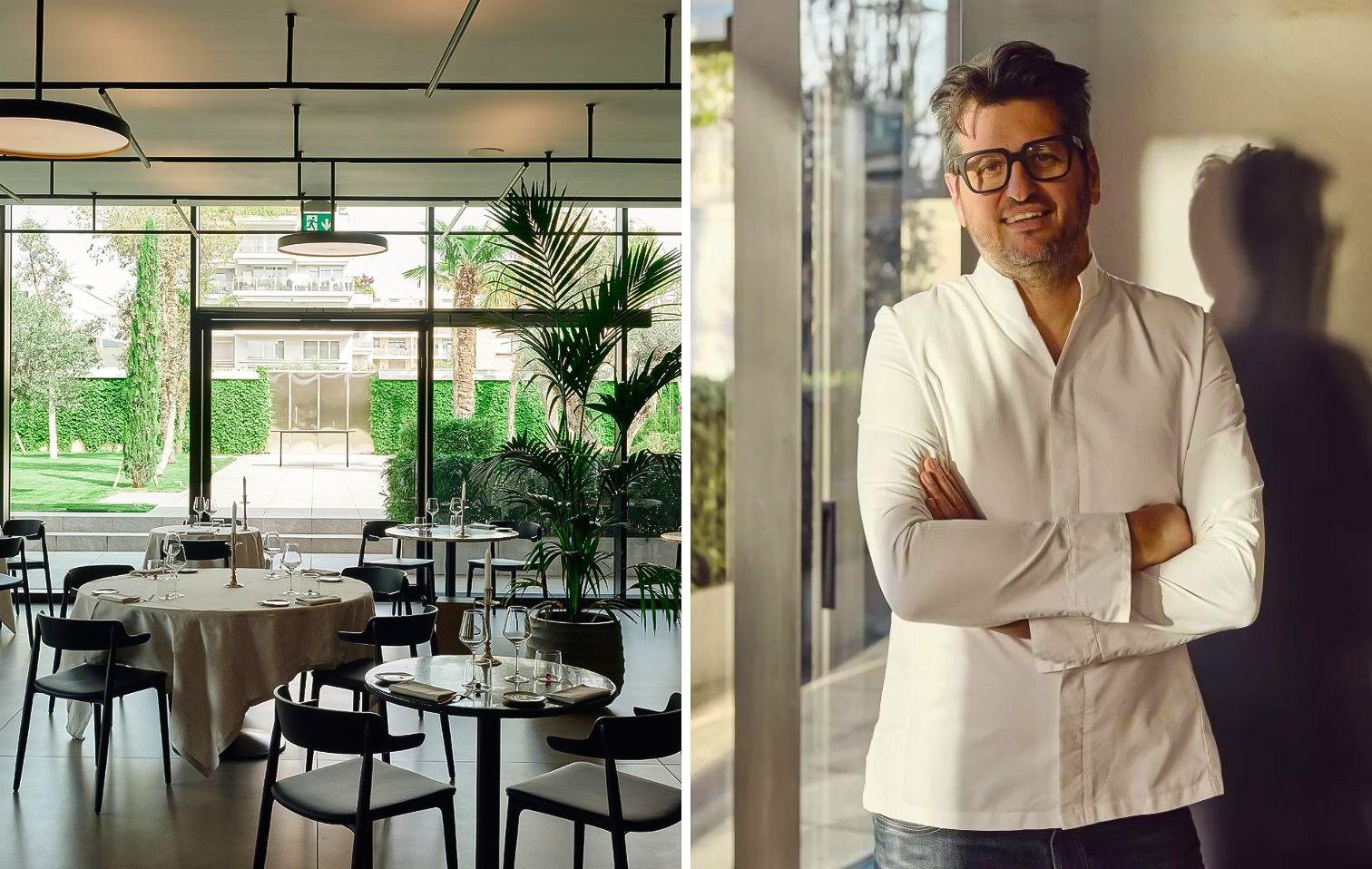After 14 years with a Michelin star, Tommaso Arrigoni's historic venue moves to the Bovisa district and becomes an oasis with the first urban beekeeping project linked to catering.
New location: changing while remaining true to oneself
On April 8, exactly 25 years after its foundation, the Innocenti Evasioni restaurant bid farewell to its historic location on Via della Bindellina (not far from Piazzale Accursio) to reopen in a new, more secluded location in the Bovisa district, right next to the Institute of Technology.
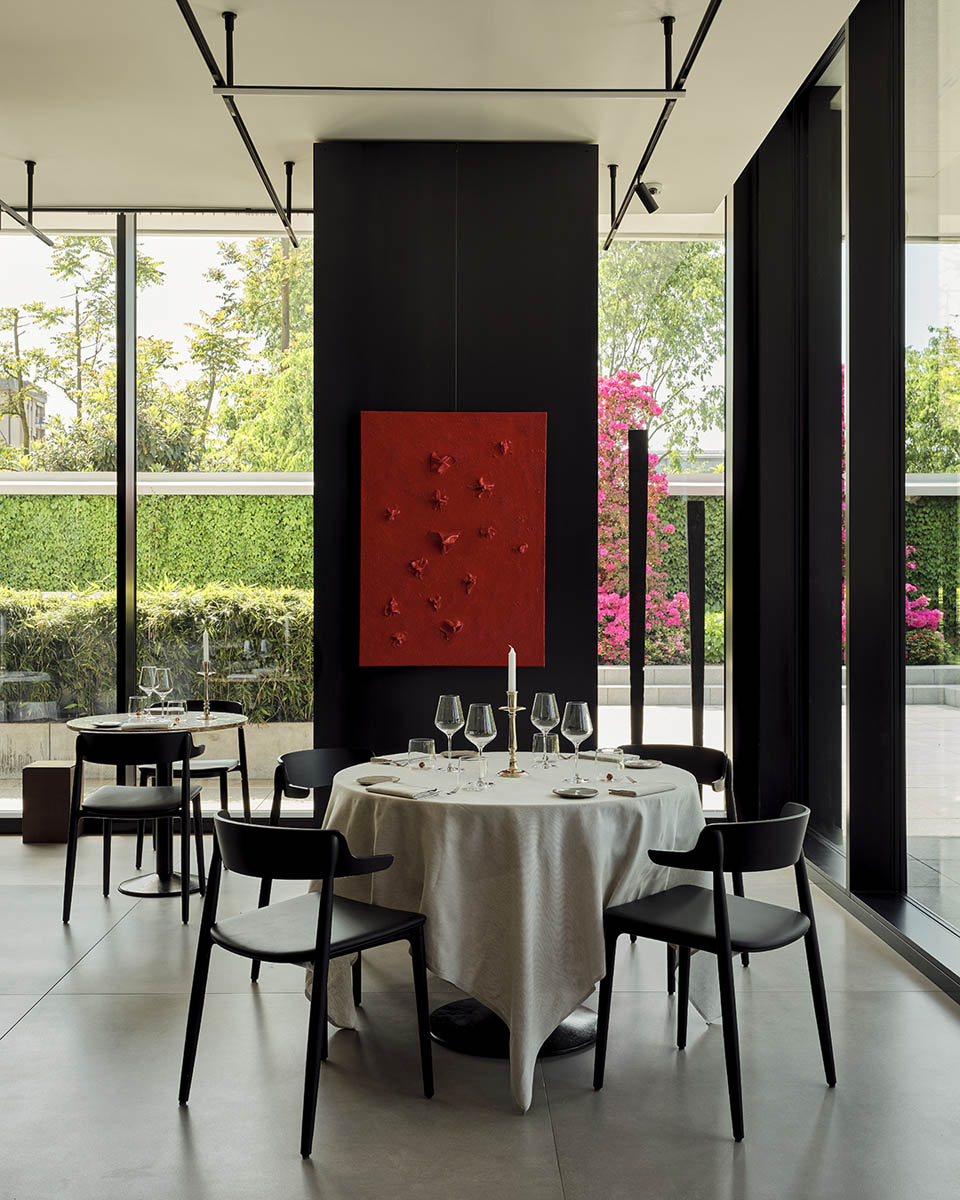
The goal? Immerse itself in a young and vibrant context, enjoy the advantage of larger spaces, both indoors and outdoors, and give itself the opportunity to grow alongside the hosting neighborhood, always promoting an idea of elegant and substantial cuisine, essential and sustainable, based on seasonality and circularity (thanks to the 100% use of raw materials), which is innovative without giving up traditional inspiration, with its revisited "poor ingredients" treated according to contemporary technique, and presented in an attractive and "young" way.
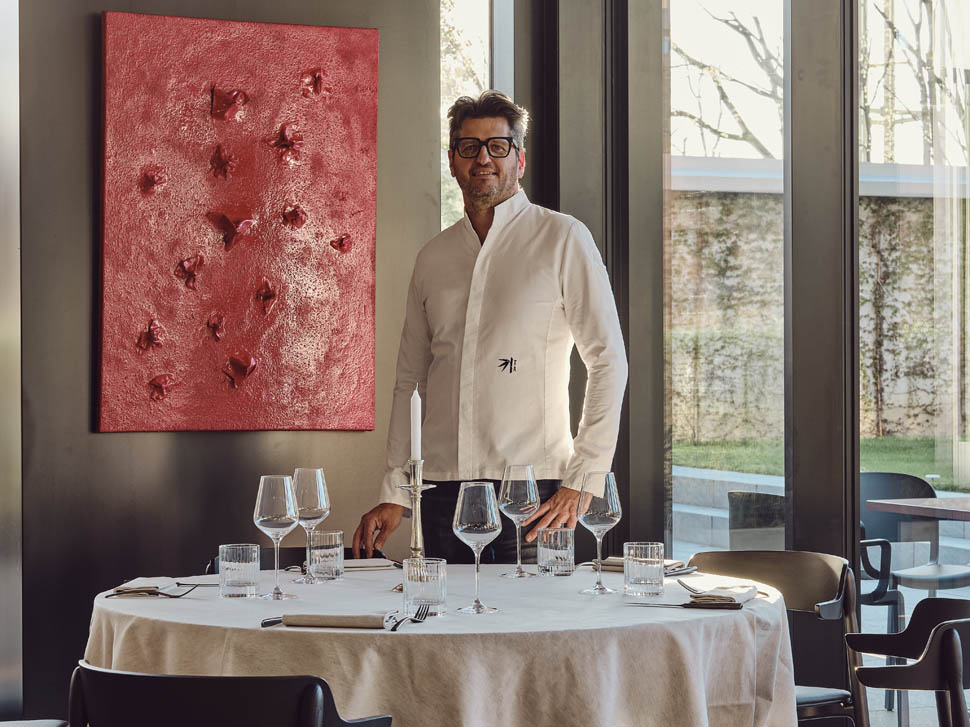
The new location of Innocenti Evasioni is a contemporary structure, recently built, happily hidden among the buildings of a neighborhood also "young", which houses the pavilions of the Polytechnic of Milan and experiences its climate of "fermentation". The restaurant is open, bright, and airy: it enjoys a beautiful tree-lined green space that houses a garden, two beehives, potted herbs, and - in the hot season - welcomes tables for outdoor dining.
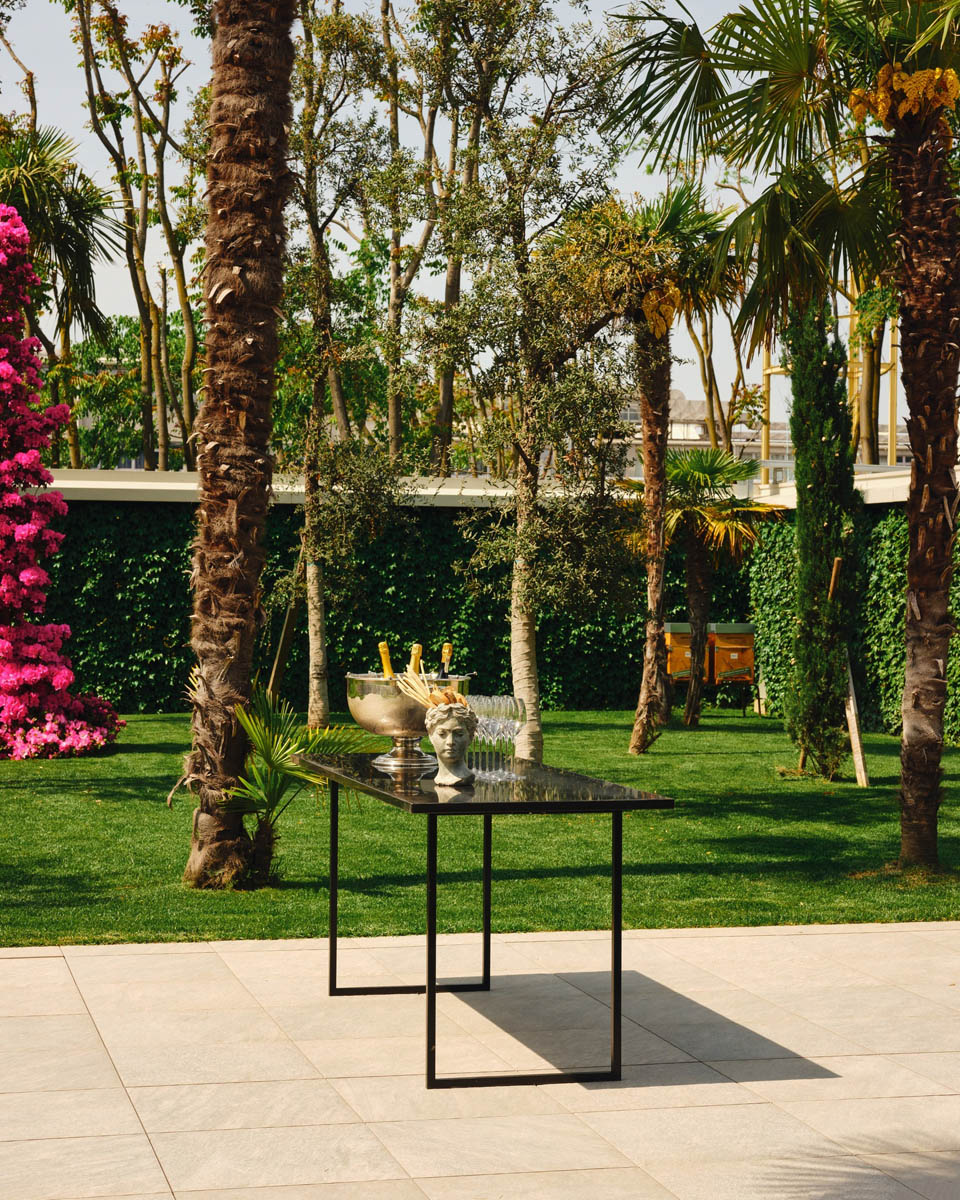
Large floor-to-ceiling windows frame this rustic, although urban setting, rhythmically with their black, rigorous but light profiles, which do not interrupt the dialogue between the outside and inside, creating a space without solution of continuity.
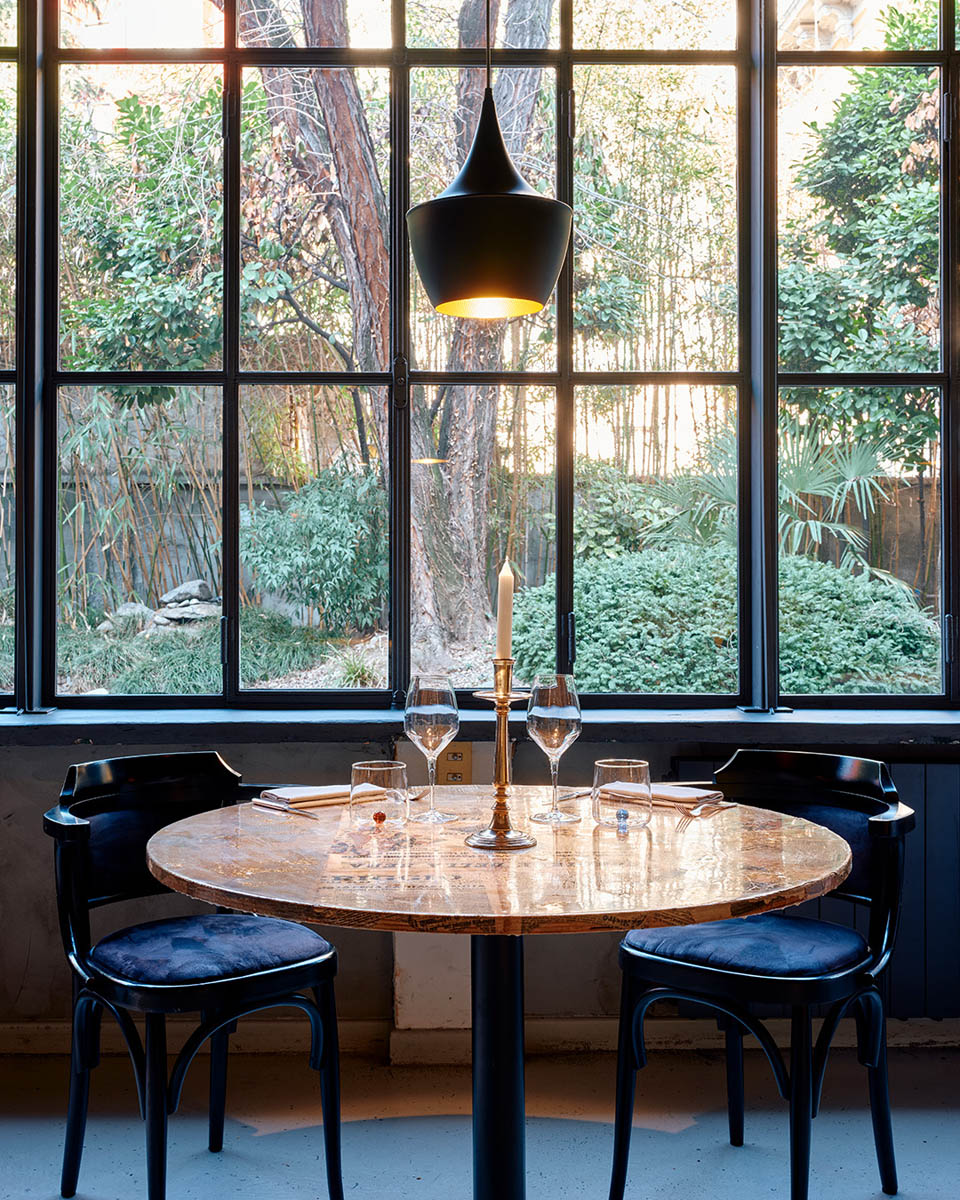
The same applies to the different areas of the indoor rooms, which, depending on the needs or specific requests of the clientele, can be redefined to create distinct yet connected environments by the coherence of a modern but welcoming design. Aesthetic cleanliness and essential mise en place adapt well to the industrial style of the place but do not lead to cold minimalism because they are softened by an evident attention to detail, from the choice of materials to the study of lights, from the choice of dishes and bread holders to the presence of objects with a strong personality that catch the eye and reveal an intention of welcome that never fades, whether choosing to share a "social" experience at the counter or sitting at a more secluded table for an intimate dinner.
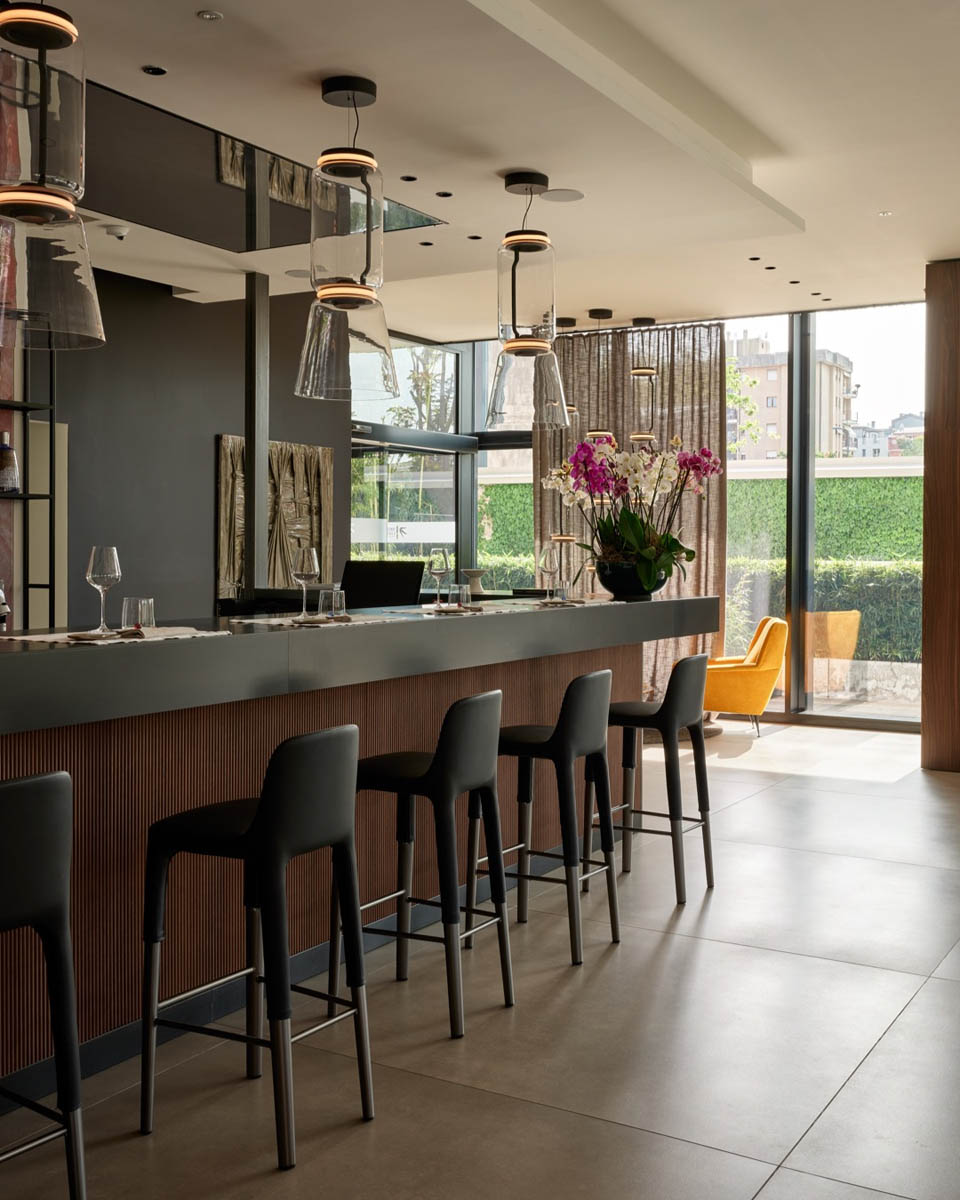
The chromatic and material interweaving (wood, glass, metals, ceramics, lacquers) that elegantly chase each other among the furnishings (from screens to designer chandeliers, from paintings to tables enhanced by the absence of tablecloths) express an idea of multisensory comfort, as well as a search for personality and beauty, which find their best exaltation in the presence of contemporary art works signed by Fabio Pietrantonio, a great friend of Chef Arrigoni and his historical artistic consultant. The room thus ceases to be a passive "set" that surrounds the kitchen, to assert its dignity and establish a distinct personality, capable of giving tactile, visual, and auditory sensations that go beyond the satisfaction of taste, anticipating it.
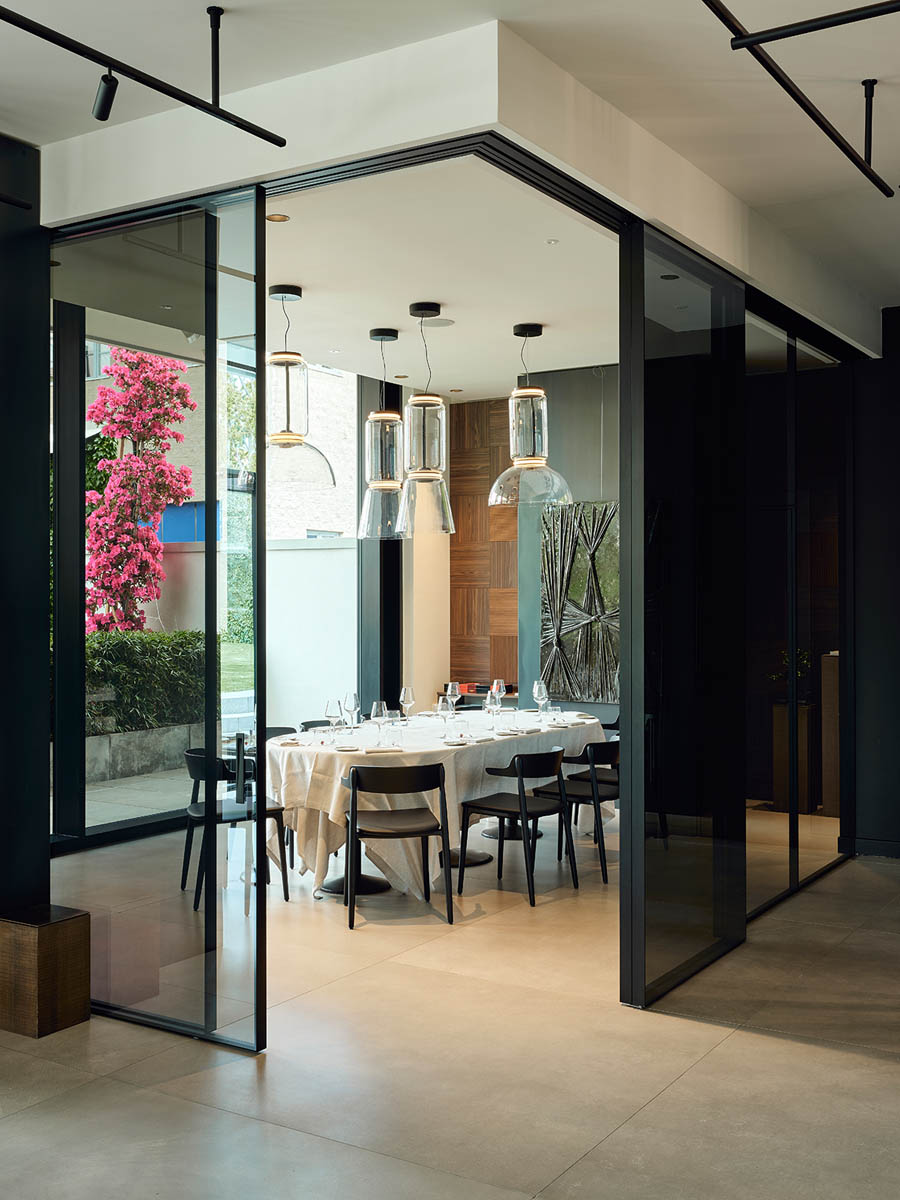
A cuisine that “observes its surroundings”
For Innocenti Evasioni, "contemporaneity" means, first of all, being a restaurant immersed in reality, aware and involved in the issues that concern it, and therefore attentive to the sustainability of its offer in all aspects. Here, like elsewhere, Chef Arrigoni has always promoted an ethical idea of cuisine that, through the adoption of virtuous practices such as reducing plastic and reusing kitchen "waste" to avoid as much food waste as possible.

In the new location, this commitment has been strengthened thanks to the location and architectural characteristics of the establishment that houses the restaurant. The outdoor garden (with a garden of 10 plots measuring 2.5 x 1 m, 2 beehives for honey, and numerous potted aromatic plants) allows the kitchen to have a percentage of "zero-mile" ingredients, integrating products purchased from trusted suppliers, selected based on the quality and sustainability of the raw material.
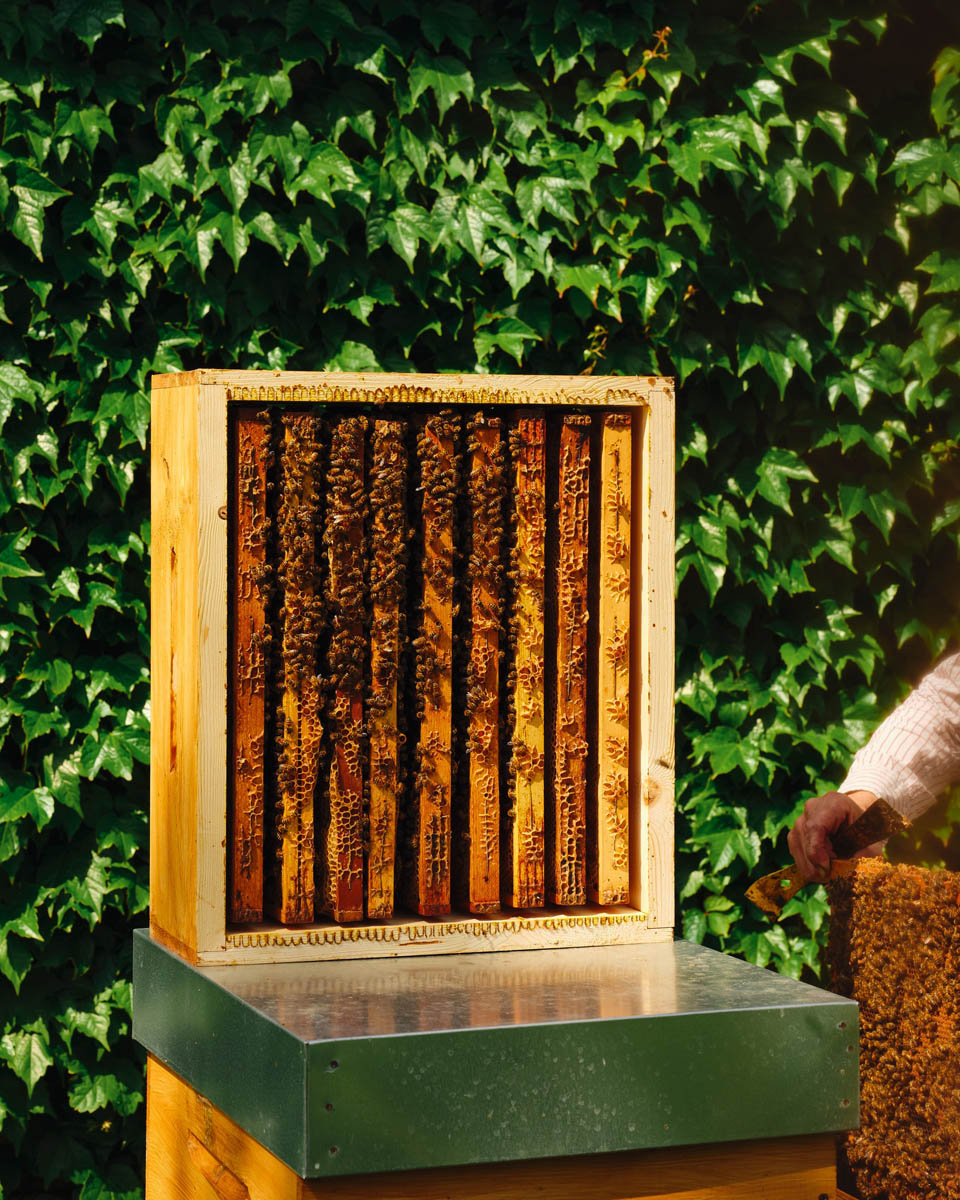
The internal spaces, on the other hand, boast solutions designed for greater energy efficiency, starting from the installation of photovoltaic panels on the roof to the adoption of LED lamps managed by a home automation system, passing through the use, in the kitchen, of state-of-the-art and highly efficient appliances, remotely controlled and connected to a system for regulating energy peaks to balance and equalize energy flows. The result is that, to date, Innocenti Evasioni represents the first example of urban beekeeping in a restaurant and can independently provide for a part of the supply of raw materials, as well as meet 30% of its energy needs.
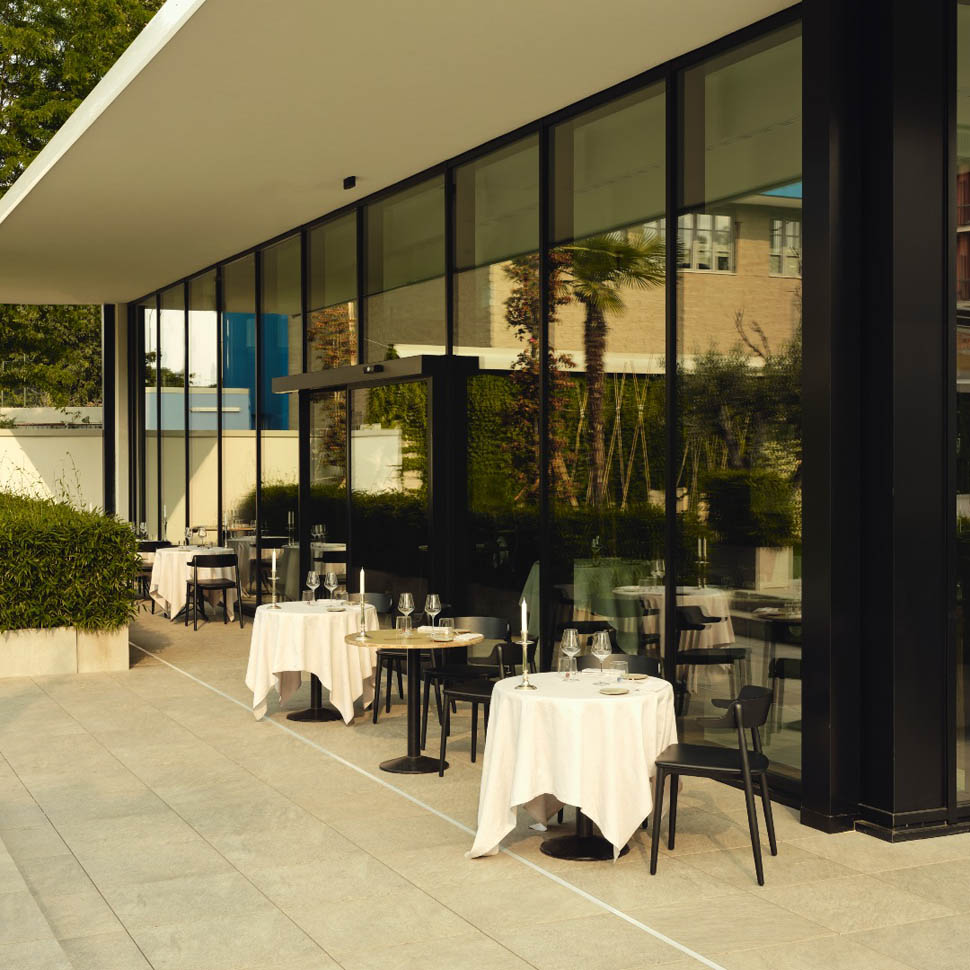
But not only that: the settlement in the new location aligned with a new search for participation in the dynamics of the neighborhood and mutual enrichment with nearby entities, which soon led to the birth of some beautiful initiatives, such as the collaboration activated with the Ibrida Brewery (to which the surplus bread is donated for beer production) and with Coltivando, the convivial garden of the Polytechnic of Milan, to which the kitchen's organic waste is destined to produce compost and fertilizers.

Young approach: from the team to the gustatory offering
"Secondly" Innocenti Evasioni can count on the same young and cohesive brigade (4 chefs and 3 waiters) that already shared Tommaso's adventure in Via della Bindellina and that now supports him in his mission to renew the approach of the new generations (especially "Gen Z") to food, to educate them to recognize and enjoy quality through an "easy" and democratic format. This is how U25x35E ("Under 25 for 35 Euros") was born, a menu available (upon online reservation) from Monday to Thursday starting at 8:00 PM, for a minimum of 2 and a maximum of 10 diners (aged between 18 and 25), and served to everyone simultaneously, directly at the restaurant counter.
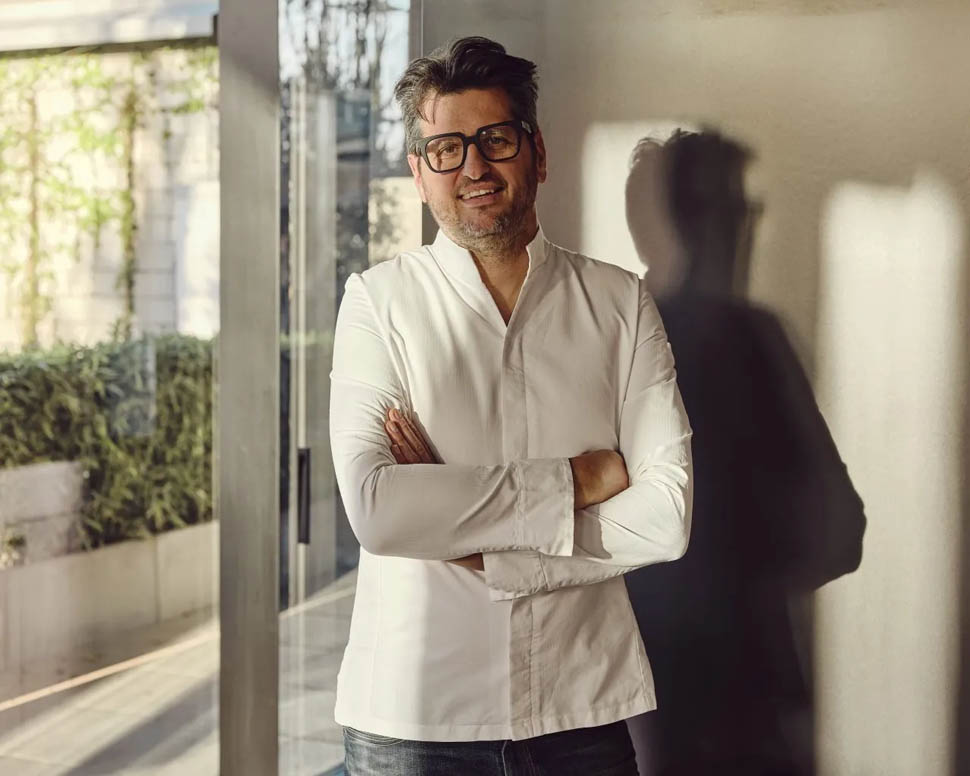
The dinner will always include an appetizer, a main course, and a dessert, accompanied by a glass of wine, water, and final coffee. The "surprise" menu formula is not only fun but also consistent with the principles of sustainability and circular economy: it allows the use of the same raw materials used in the placée tasting menus, as well as drawing ad hoc recipes created to avoid the waste of unused ingredients.
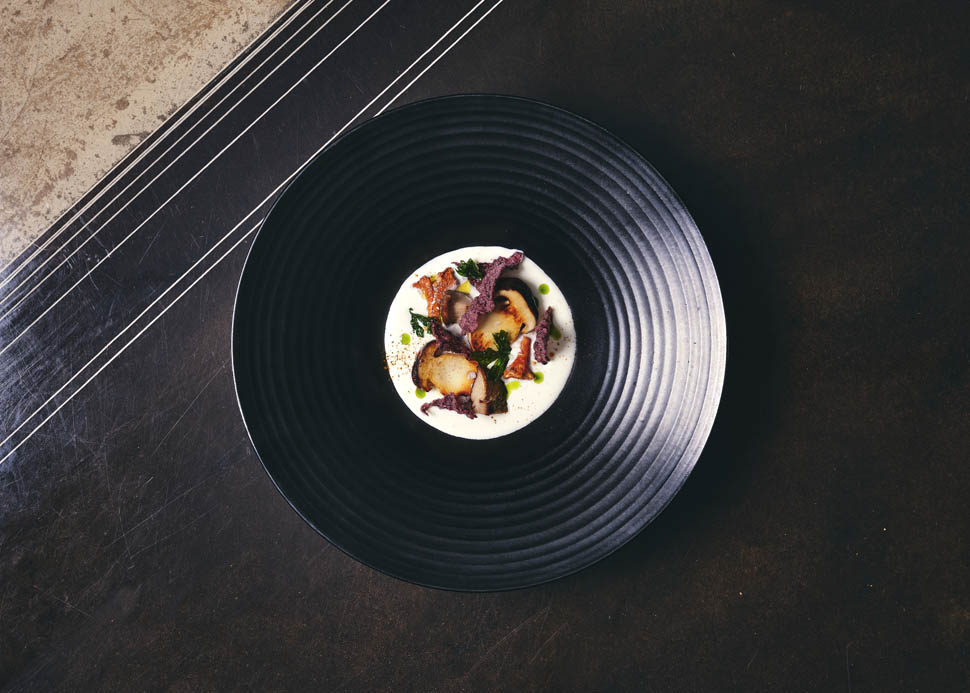
In addition, the economically accessible declination and the convivial spirit of the "social table" reflect the desire to invest in a future public of fine dining lovers capable of recognizing and appreciating healthy, seasonal food, worked with respect for its intrinsic qualities, as well as reclaiming the "social" value of shared food, which thus becomes not only a taste experience but also an opportunity for knowledge, dialogue, comparison, and relationship.
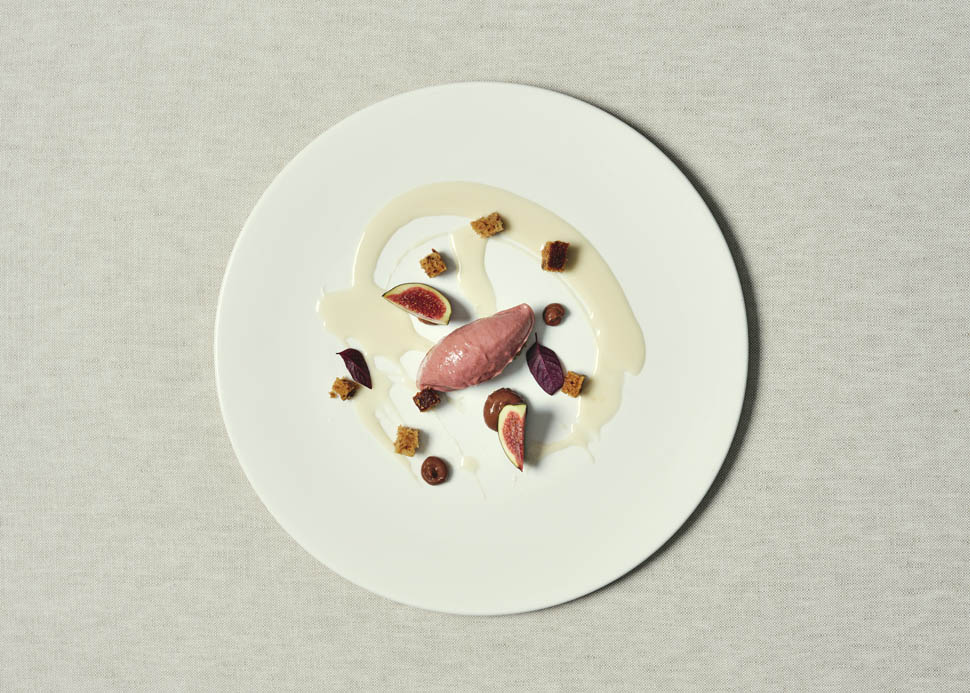
Less menus, more inspirations
Chef Arrigoni has embraced the trend in contemporary dining to diminish the importance of à la carte offerings, making room for one or more tasting menus. These menus are crafted as journeys to discover a culinary philosophy or a multisensory thread tied to the history of a chef, a dish, or a singular ingredient. At Innocenti Evasioni, the offering unfolds along three seasonal paths, sharing the quality of raw materials and a clear attachment to the land.
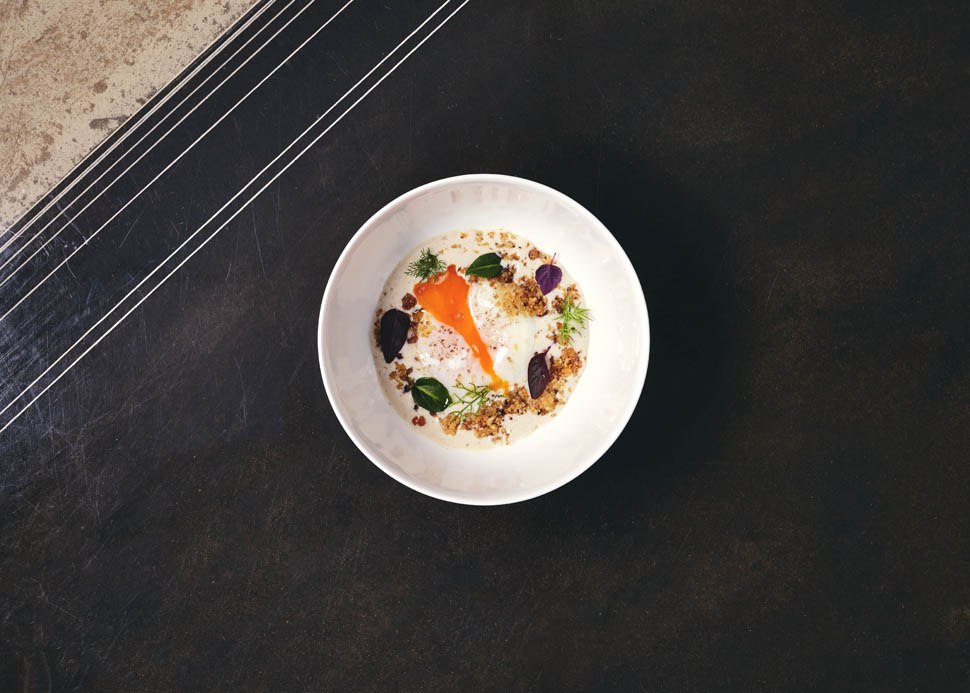
The first includes 6 "full" courses made based on the products offered by nature, according to the season and meteorological conditions (100 € per person + 38 € for the pairing of 4 wines); the second (6 Mezze) allows those who do not want to exaggerate to taste everything in a "half" version (80 € + 35 € for the wines); the third (La Storia siamo noi) includes classic dishes that have made the history of the restaurant (75 € + 25 € for the glass pairing). À la carte menu is available but is resolved in the possibility of choosing between 2 or 3 courses plus dessert (at 70 or 90 €) provided among the tasting menu items. The wine list includes about 300 labels, from large or small cellars, mostly Italian, including Arrilonga, the organic wine from Monferrato that the chef produces directly with his wife. There is also a valid selection of Champagnes, mostly imported from small producers operating in an organic system.
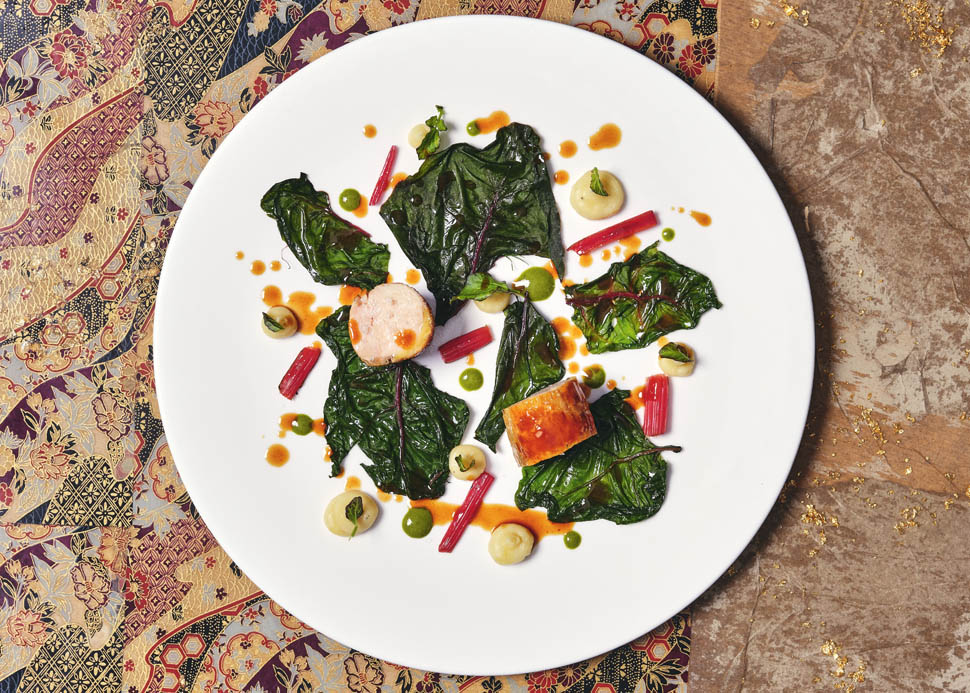
Three menus designed as a "flexible path"
Each path is the expression of a culinary style that is both reassuring and determined, as well as surprising but also colloquial; the result of the intertwining of many possible combinations of tastes, colors, aromas, and different consistencies, but also the realization of a dynamic balance between the search for a recognizability of taste and a push for innovation, to amaze the diner but at the same time evoke a past impressed in his sensory memory.
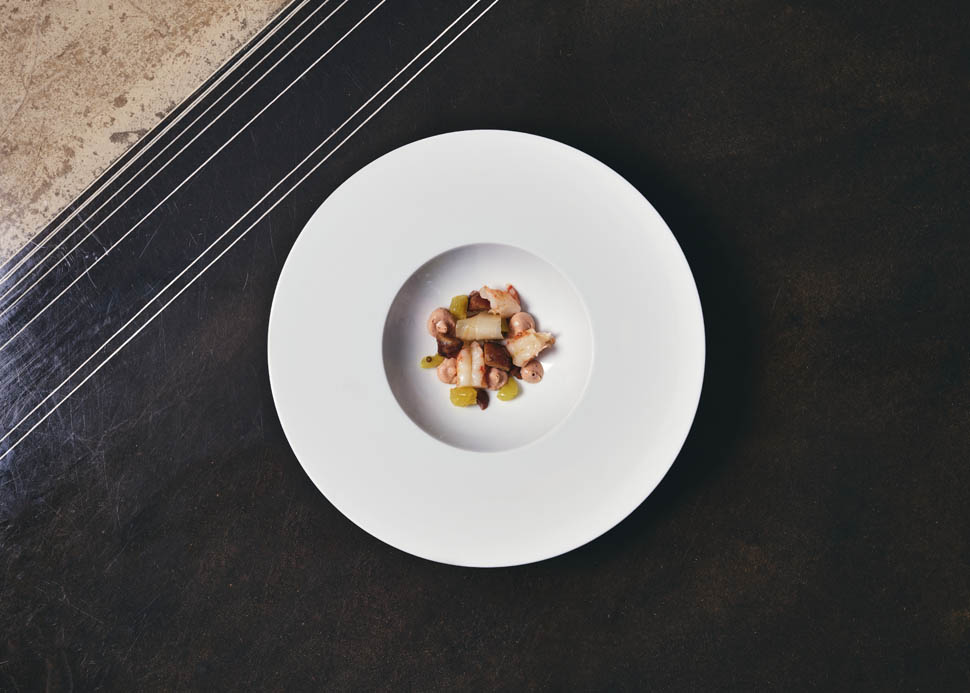
Throughout the succession of courses and within each dish, a sequence of harmonious counterpoints takes shape. Thus, the delicacy of the Raw scampi and cauliflower (contrasted by foie gras mayonnaise, softened by persimmons, and accompanied by oyster leaf) or the Prawns slow cooked in oil (with vanilla chestnut puree, blown white butter with leeks, and raisins) can be followed by the wild taste of Braised hare-filled Ravioli (with mild ragusano sauce, figs, and chocolate) or the significant flavor of Angus Diaphragm (with honey-matured radicchio and BBQ sauce).
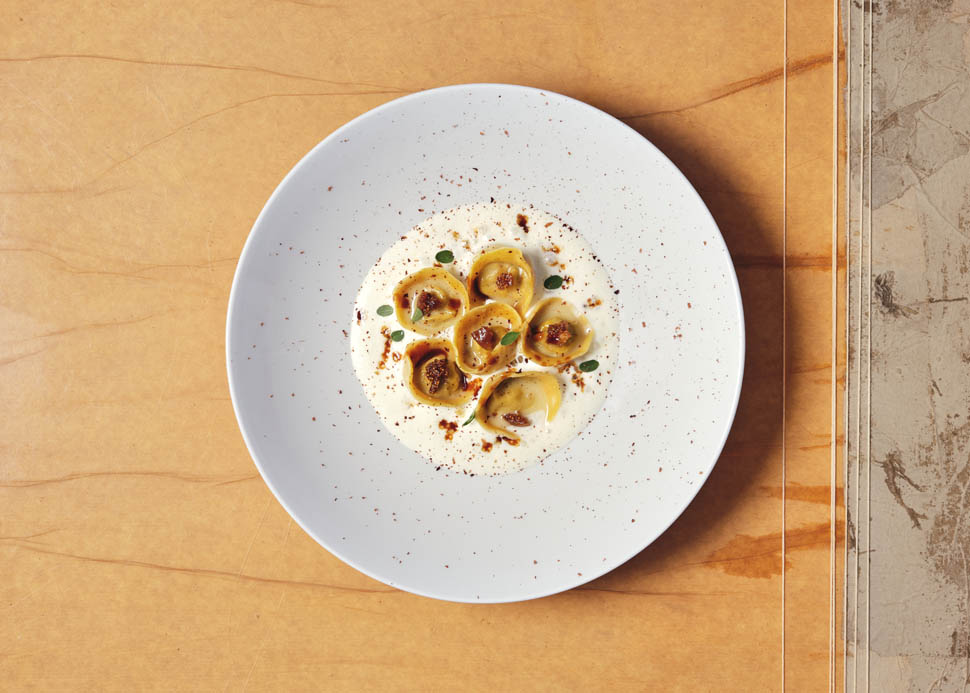
While the "flattering" butteriness of Duck Foie gras or the creaminess of Pumpkin pulp with chestnut is pleasantly belied by some contrasting elements that elevate the dish to a more interesting level (in the first case, the accompaniment of a fruit compote and pan brioche; in the second, the softness of goat cheese and juniper).
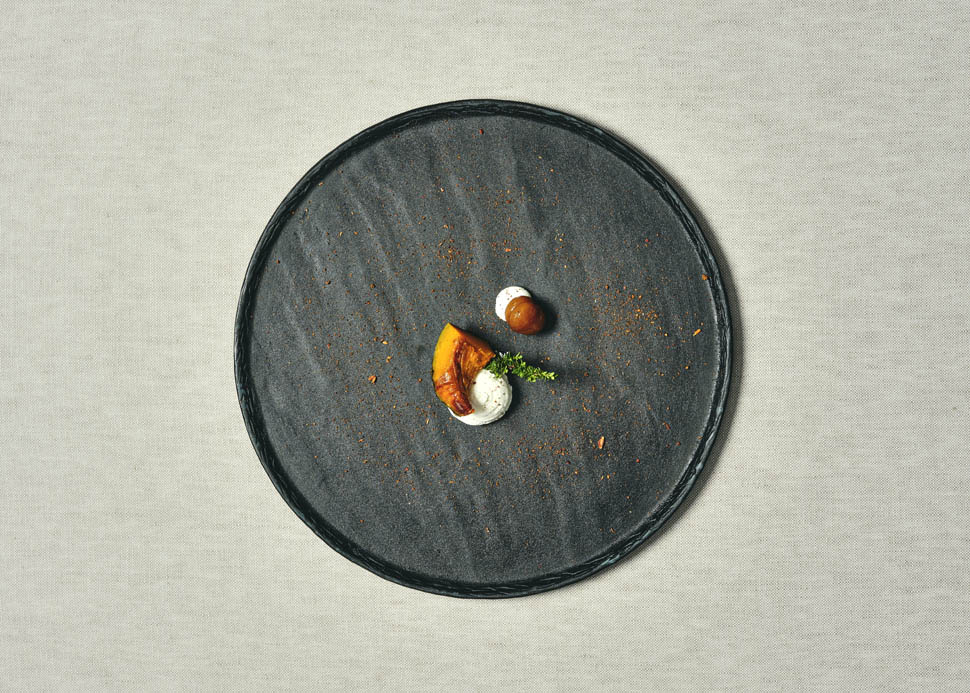
Even where the chef aims to re offer traditional Italian dishes (some on the menu at Innocenti Evasioni for more than 20 years), there is never a lack of the "surprise" effect given either by the preparation techniques (as in Bread and buffalo cream, with spring onion, sous-vide egg, and black truffle powder) or by the original pairing of ingredients (in Mischiato Potente di Gragnano, the authenticity of mixed pasta risottata (cooked like a risotto) with chickpeas, cod tripe, and broccoli is enriched by the pungent touch of fermented lemon; the same as the apple puree and mustard that accompanies in an original way the Sea bass fillet with black cabbage sautéed in butter).
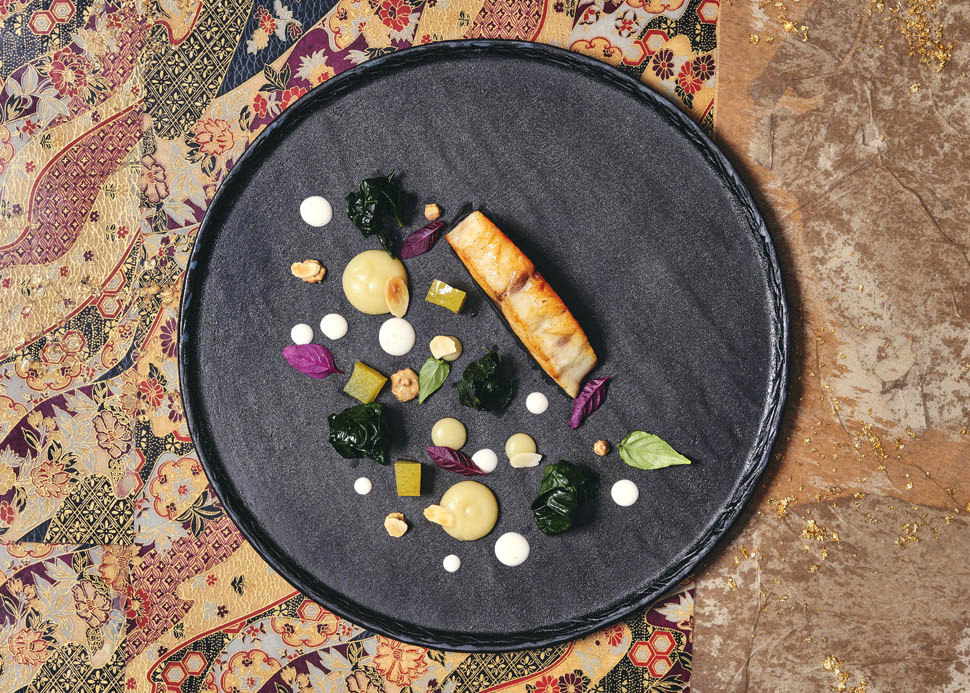
Classicism and avant-garde coexist in such harmony that, at the end of the gustatory journey, it is difficult to express a preference for traditional dishes rather than more innovative ones. The only option left is to withhold judgment, welcome the sensations, the memories and moments of contemplation offered by the lived experience, and yield to the "innocent getaways" provided by the venue and the chef, with the awareness that to find oneself, one must first get lost. Where? In the story of the dishes, in their multifaceted flavor, and even before that in the atmosphere of a new space that already has much to tell.
